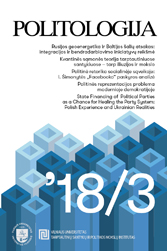KVANTINĖS SĄMONĖS TEORIJA TARPTAUTINIUOSE SANTYKIUOSE – TARP ILIUZIJOS IR MOKSLO
QUANTUM MIND THEORY IN INTERNATIONAL RELATIONS: BETWEEN ILLUSION AND SCIENCE
Author(s): IEVA SKURDAUSKAITĖSubject(s): Epistemology, Logic, Philosophy of Science, International relations/trade
Published by: Vilniaus universiteto leidykla & VU Tarptautinių santykių ir politikos mokslų institutas
Summary/Abstract: Since the 19th century, social sciences have been dominated by positivist thinking, which is based on the Newtonian worldview and implies mechanistic, deterministic, materialistic and atomistic methodological tools for conducting researches. However, this Newtonian worldview can not explain the phenomenon of consciousness and thus leaves the scientists with the unresolved body-mind problem. The solution has been recently offered by quantum theory, which challenges the classical thinking by completely changing its ontology, or, to be more precise, which aims at unifying social and physical ontology and laying the ground for the minded matter. In one of the most recent and prominent scholarly books, written by A. Wendt and titled Quantum Mind and Social Science: Unifying Physical and Social Ontology, the author claims that consciousness is a quantum mechanical phenomena and that all of us are in fact a walking wave function. If that is true, then human society must also have quantum qualities. Even though A. Wendt offers a solution to one of the longlasting questions of social science, he leaves us without any explanations of how the theory might impact the discipline of international relations. Therefore, this paper is focused on 3 questions: 1) How does quantum mind theory challenge positivist thinking in international relations? 2) How does it broaden/narrow our current understanding of international relations – namely, what is the relationship between quantum mind theory and other postpositivism theories? 3) How does quantum mind theory impact international relations? An analysis of the challenges posed to classical thinking and a comparison of the differences and similarities with critical theory, postmodernism and constructivism revealed that quantum mind theory is not yet a new social sciences paradigm or a valid independent theory, but that it could be used as a theoretical tool of postmodernism. The main reasons involve a lack of empirical researches, scholarly supporters and consistent epistemological logic.
Journal: Politologija
- Issue Year: 2018
- Issue No: 3 (91)
- Page Range: 48-95
- Page Count: 48
- Language: Lithuanian

